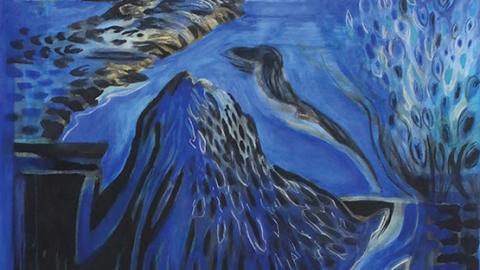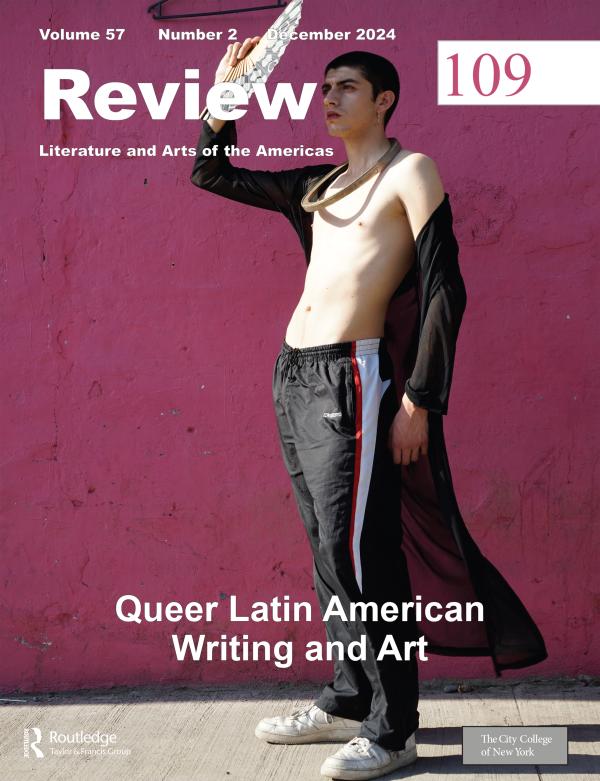Review: Literature and Arts of the Americas
Review: Literature and Arts of the Americas is the major U.S. forum for contemporary Latin American and Caribbean writing in English and English translation; it also covers Canadian writing and visual and performing arts in the Americas. Founded in 1968 by the Center for Inter-American Relations (later known as the Americas Society), Review is now published by Routledge in association with The City College of New York, CUNY, through its Department of Classical and Modern Languages and Literatures. Daniel Shapiro serves as the journal's Editor.
Review regularly features critical articles, fiction, poetry, essays, book reviews, and arts profiles. It has showcased work by/about Isabel Allende, Jorge Amado, Jorge Luis Borges, Guillermo Cabrera Infante, Alejo Carpentier, Julio Cortázar, Carlos Fuentes, Gabriel García Márquez, Clarice Lispector, Elena Poniatowska, Manuel Puig, Luis Rafael Sánchez, Mario Vargas Llosa, Derek Walcott, and many other writers as well as critics, translators, and visual and performing artists. Translators who have published their work in Review include the late Gregory Rabassa, Edith Grossman, Suzanne Jill Levine, Alfred Mac Adam, and Margaret Sayers Peden, in addition to numerous younger practitioners. Through the years, issues have focused on the above and other iconic authors and on foundational works of literature such as García Márquez’s One Hundred Years of Solitude, Pablo Neruda’s Residence on Earth, and Vargas Llosa’s Conversation in the Cathedral, as well as on diverse and timely themes, including, more recently, Cuba Inside and Out, Eco-Literature in Latin America, 21st Century Mexican Writing and Arts, Latin American Cyber-culture, and The Americas in New York.
JOIN US!
Review 109 on Site and Virtual Launch: Thursday, October 9, 2025
Review 109, guest-edited by Javier Guerrero, compiles academic essays by scholars as well as texts by writers and poets who identify as LGBTQ+ and/or who explore related themes in their work. Articles include Diamela Eltit’s meditation on Chilean writers Augusto D’Halmar and Gabriela Mistral; Cecilia Palmeiro’s “Desire as Business,” which addresses Néstor Perlongher’s research in “gender anthropology” in São Paulo and his role in the LGBT movement in Latin America; Mariano López Seoane’s essay on the “In-Between” nature of author Sylvia Molloy’s work; and Guerrero’s own homage to Reinaldo Arenas’s “Queer Constellations of Love.” The creative contents include texts by Molloy, Arenas, and Manuel Ramos Otero; as well as fiction, nonfiction, and poetry by writers from throughout the continent—Mario Bellatín, Gabriela Cabezón Cámara, Rita Indiana, Glauco Mattoso, and Ariel Florencia Richards, among others—whose texts explore universal themes related to dreams, desire, transformation, and mortality. The issue includes Paz Errázuriz’s photographs from her Ropa Americana series; as well as feature pieces and book reviews. Cover image: Paz Errázuriz. Cover design: Daimys García.
Review Magazine: Translation Celebration on April 23, 2025
Review 108 on Site Launch: Thursday, November 7, 2024
Shepard Hall 291 (Screening Room) 6:00 - 8:00 pm (ET)
160 Convent Avenue, New York, NY 10031
Table of Contents No. 108 Issue. Review
Review 108, guest-edited by Carmen Boullosa (Macaulay Honors College, CUNY) and Lucía Melgar (ITAM, Mexico) showcases the work of women scholars as well as fiction and non-fiction writers and poets active throughout Latin America. Melgar contextualizes Latin American women’s writing and introduces essays by scholars Alejandra Giovanna Amatto Cuña, Irma Pineda, Daniela Rea, and Socorro Venegas on themes including new Latin American fiction by women, contemporary Indigenous women’s writing, challenges faced by Latin American women journalists, and the role of UNAM’s Vindictas program in promoting forgotten and emerging Latin American women writers. Boullosa’s introduction acknowledges iconic figures such as Lydia Cabrera, Nelly Campobello, the Ocampo sisters, Cristina Peri Rossi, and Alejandra Pizarnik, and details the creative contents, representing various generations, countries, and traditions. These include an interview with authors Diamela Eltit and Margo Glantz; followed by fiction, non-fiction, testimonial writing, and poetry by Ave Barrera, Liliana Colanzi, Ramona de Jesús, Paula Mónaco Felipe, Alicia Dujovne Ortiz, Carmen Villoro, and others. The issue also showcases drawings by artist Magali Lara. Review 108 presents two special Features—an excerpt from Suzanne Jill Levine’s memoir, Faithful: A Life in Translation; and Ana María Hernández del Castillo’s essay on Mario Vargas Llosa’s Captain Pantoja and the Special Service, edited from her lecture for CCNY’s 2023 Cátedra Mario Vargas Llosa. The issue includes reviews of titles in translation by authors Boullosa, Ariel Dorfman, María Negroni, and Juan Gabriel Vásquez, and by artist Hélio Oiticica. Cover image by Magali Lara. Cover design: Daimys García.
Review 107 On-Site Launch: Wednesday, April 17, 2024, 6:10 - 8:00 p.m. (ET)
Watch videos of Review Magazine launch no. 107
Review 107, guest edited by scholar Will H. Corral, presents contemporary nonfiction by the most current generations of Spanish American writers. Corral’s introduction emphasizes the dialogues the contributing authors have with other literary traditions, and also considers the nature of the genre of nonfiction. Articles, by scholars Carlos Burgos, Corral, Marcela Croce, and Antonio Villarruel, address topics including the state of the essay in Mexico and Central America, the Caribbean, and the Andean countries, as well as that of the crónica in Latin America. Creative texts showcase essays as well as an interview on a broad array of topics by prominent and emerging authors, among them, Gabriela Alemán, Jazmina Barrera, Carmen Boullosa, Horacio Castellanos Moya, Mariana Enriquez, Ariana Harwicz, Julián Herbert, Eduardo Lalo, Patricio Pron, Mayra Santos-Febres, Samantha Schweblin, Juan Gabriel Vásquez, and Alejandro Zambra. The texts have been translated by a breadth of renowned translators, among them Ezra Fitz, Sean Manning, Megan McDowell, Christina MacSweeney, Andrea Rosenberg, and Samantha Schnee. The nonfiction presented in Review 107 underscores the truly international character of Latin American literature and its place in world literature. The issue includes two Features—a memorial piece, by translator and board member Elizabeth Lowe, on Brazilian novelist Nélida Piñon; and excerpts from Mexican playwright Sergio López Vigueras’s Tartarus. Reviews cover titles in translation by João Almino, Homero Aridjis, Amanda Berenguer, Sergio Missana, Angelina Muñiz-Huberman, and Verónica Zondek, as well as of the Gego exhibition at the Guggenheim Museum.
Review 106 On-Site Launch: Thursday, October 12th, 2023, 06:00 PM - 8:00 PM [ET]
Review 106, guest-edited by Néstor E. Rodríguez (University of Toronto), focuses on contemporary Dominican writing and arts—compiling articles by leading scholars and texts by writers residing in and outside the Dominican Republic. This issue is particularly important given the presence of the Dominican community at The City College of New York, Review’s host institution. The articles, by Emily A. Maguire, Sharina Maillo-Pozo, Danny Méndez, and Elizabeth Russ, address topics including challenges to hegemonic narratives, transnational dynamics in the borderlands, sexual identity, and blackness/whiteness, as manifested in works by Rita Indiana, Josefina Báez, Johan Mijail, and Jeannette Miller. The creative contents showcase fiction, creative nonfiction, and poetry by Rey Andújar, Aurora Arias, Frank Báez, Josefina Baéz, José Mármol, Miguel Yarull and others. The combined selections reflect the innovation and breadth of Dominican writing today. Features include a memorial piece on the late Sylvia Molloy, by Prof. Andrea Weiss; an excerpt from Sergio Ramírez’s novel Dead Men Cast No Shadows; and poetry by Marjorie Agosín and Lorenzo García Vega. Reviews cover titles in translation by Pedro Mir, Mario Vargas Llosa, and Óscar Hahn, and Cecilia Vicuña’s exhibit at the Guggenheim Museum.
Review 105 Virtual Launch: Thursday, April 20th, 2023, 5:00 P.M. - 7:00 P.M. (ET)
Review 105, guest edited by Carlos Riobó (The City College of New York and The Graduate Center, CUNY), compiles a plethora of texts largely inspired by the city of Havana, beginning with academic essays by scholars Ted Henken, Justo Planas Cabreja, Roseli Rojo, and Secundino Fernández, who explore, respectively, two significant periods in Cuban journalism from the late-twentieth to the early twenty-first century; the geopolitics of sex tourism in Havana; the role of steam power in nineteenth-century Cuba; and the ongoing project to develop a subway in Havana. The creative section showcases texts by writers residing both in and outside Cuba, among them, articles by activist Yoani Sánchez, poetry by the renowned Nancy Morejón and by a host of younger voices as well as by U.S. inaugural poet Richard Blanco; and fiction by novelist Ahmel Echevarría. The issue also includes reviews of Cristina García’s radio play The Palacios Sisters and of Achy Obejas’s latest poetry collection, Boomerang / Bumerán; and a portfolio of photos highlighting landmarks and lesser-known spots in the city of Havana. In addition to the Cuban contents of Review 105 are an excerpt from David Unger’s translation of Miguel Ángel Asturias’s Mr. President, and reviews of titles in translation by Juan Gabriel Vásquez, Carlos Germán Belli, and Mexican poets Gloria Gervitz and María Baranda, among other titles.
Review 104 Virtual Launch: Thursday October 13th, 2022, 5:00 - 7:00 p.m. (ET)
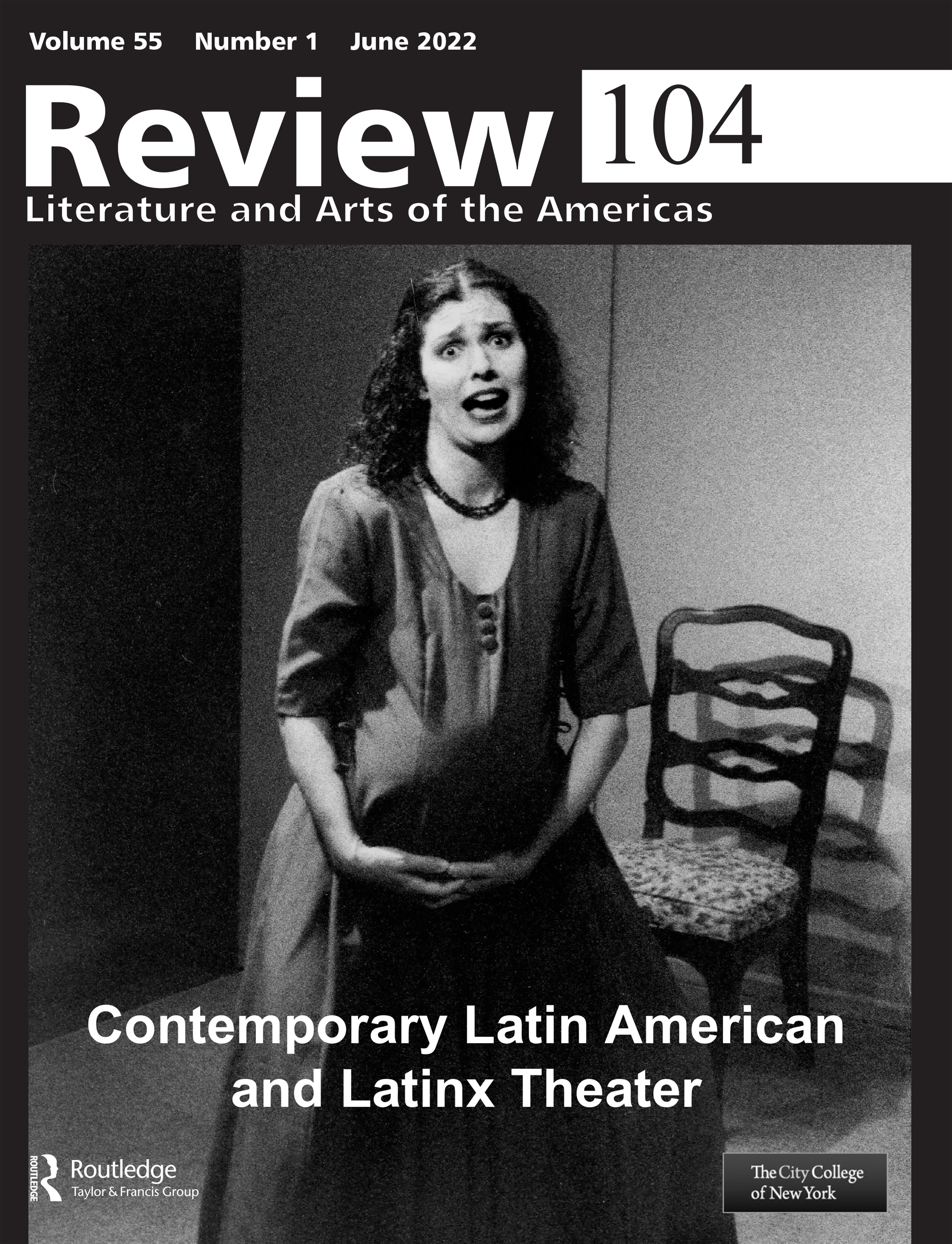
Review 104, guest edited by Priscilla Meléndez (Trinity College), compiles academic essays by renowned scholars of Latin American and Latinx theater and literature—Jacqueline Bixler, Debra Castillo, Jimmy Noriega, and Vicky Unruh—who explore the work of specific playwrights and topics such as border and queer theater; and plays and play excerpts by prominent and emerging playwrights—among them, Sabina Berman, Carlos-Manuel, Teresa Hernández, Ana Istarú, Conchi León, Hugo Salcedo, Aristides Vargas, and Zulynette—whose texts address issues relating to identity, race, gender relationships, and religion. The contents collectively reflect the evolution of Latin American and Latinx theater over past decades to the present moment, as well as that theater’s enduring accessibility. Features in the issue include a previously untranslated radio play by Severo Sarduy, newly translated poetry by Julio Cortázar, fiction by Carlos Franz, and poetry by Javier Campos.
Review 103 Virtual Launch: Thursday, April 7, 2022
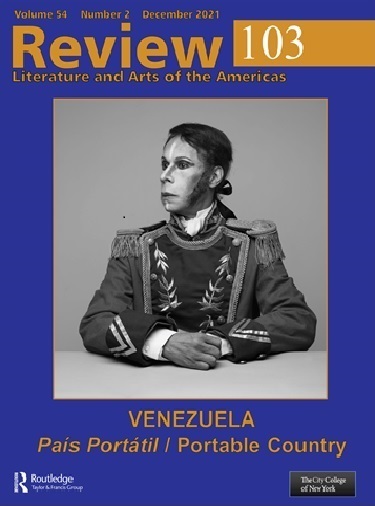
Review 103, guest-edited by Javier Guerrero (Princeton University), focuses on contemporary Venezuelan writing and arts, compiling a “portable country” (país portátil) of academic and personal essays, poems, songs, short stories, and novel excerpts as a microcosm of the Venezuelan nation. The contents represent various generations of Venezuelan scholars, writers, and poets who explore themes including national, personal, and sexual identity; political ideology and violence; and migration, exile, and diaspora vis à vis Venezuelan intellectual life and creative activity inside and outside the country. Guerrero’s introduction, “Walking Around,” is followed by a selection of articles by leading scholars of Latin American literature—Gustavo Guerrero, Yolanda Pantin, Gina Saraceni, and Cecilia Fajardo-Hill-and texts by iconic prose writers such as Rafael Cadenas, Victoria de Stefano, and Ana Teresa Torres, as well as by important younger writers—Rafael Castillo Zapata, Jacqueline Goldberg, Yolanda Pantin, and Karina Sainz Borgo, among others. Features include a newly translated excerpt from Andrés Bello’s nineteenth-century epic poem “Agriculture in the Torrid Zone”; a conversation by noted scholars Raquel Chang-Rodríguez, Alfred Mac Adam, Ana María Hernández, and Carlos Riobó on Mario Vargas Llosa’s The Time of the Hero) (CCNY Cátedra Mario Vargas Llosa); and the opening chapter from Colombian author Jaime Manrique’s novel, “If You See Me along the Road.” Book reviews cover titles in translation by Sergio Ramírez, Guadalupe Nettel, Alonso Cueto, and other Latin American authors.

Review 102, “Digital Brazil: Voices of Resistance,” guest-edited by Elizabeth Lowe (New York University), compiles texts originally produced / circulated via social media, blogs, and other digital platforms, as well as through print media. The contents explore themes relevant to the political, economic, environmental, and social challenges in Brazil today. The cover and inside photographs, by Vincent Catala, visually document individuals, buildings and streets in São Paulo during the Coronavirus pandemic’s terrifying height. The essays and literature in the issue, as discussed in Prof. Lowe’s introduction, include critical essays, respectively, by Cristina Ferreira Pinto-Bailey on “Black Brazilian Feminisms,” by Paulo Dutra on “Resistance and Dissidence,” and by Leila Lehnen on “Decolonizing Fictions” in Afrofuturism; as well as fiction, non-fiction, poetry, and blogs by a breadth of “voices of resistance.” Among the writers showcased are Fabricio Corsaletti, J.P. Cuenca, the above-mentioned Dutra, Conceição Evaristo, Noemi Jaffe, Fábio Kabral, Djamila Ribeiro, and Cristiane Sobral. In respective memorial pieces, Nélida Piñon and Paula Parisot reflect on the late author Rubem Fonseca. Special Features include poetry and art by Salgado Maranhão and the late Will Barnet; an interview, by Jerry Carlson, of author Senel Paz; and poems by Mariela Dreyfus. The issue concludes with reviews of Raquel Chang-Rodríguez and Carlos Riobó’s Talking Books with Mario Vargas Llosa, The Collected Stories of Juan Carlos Onetti, and of other titles by writers from across the hemisphere.
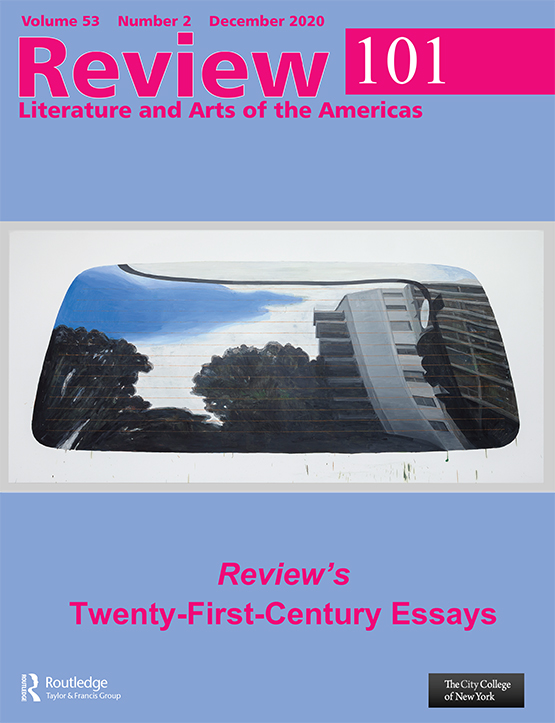
Review 101, guest-edited by Suzanne Jill Levine and Alfred Mac Adam, is the second of two retrospective issues featuring essays published in the magazine from its early years to the present. This issue covers the period from 2001 to 2019. The essays compiled here explore a breadth of topics, among them the Latin American city as observed by Latin American writers and scholars such as Alfredo Bryce Echenique and Lisa Block de Behar; texts on figures such as Pablo Neruda, Clarice Lispector, and Mario Vargas Llosa; memorial pieces on Gregory Rabassa, Alastair Reid, and Rosario Ferré; reflections by various authors—Carmen Boullosa on the 9/11 tragedy, Homero Aridjis on his origins as an environmental activist, and Sergio Ramírez on Rubén Darío’s literary formation; and overviews of key movements and schools, e.g., Philip Swanson’s “Pop Goes the Boom” and Aníbal González’s essay on Nuevísimo Spanish American literature. Features include a selection of paintings by cover-artist Jorge Macchi; commemorations of three giants in the literary world—Peruvian literary critic José Miguel Oviedo, Nicaraguan poet Ernesto Cardenal, and Caribbean poet and cultural historian Kamau Brathwaite; and a text by Senel Paz on Gabriel García Márquez. Book reviews cover new titles in translation as well as recent critical works.
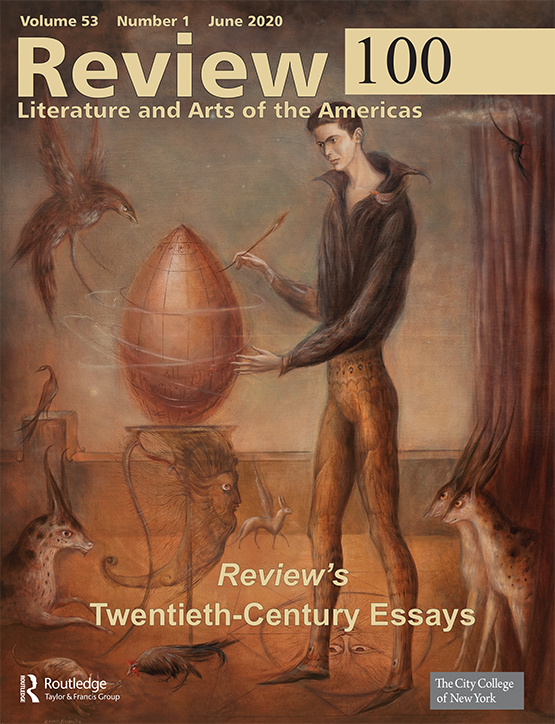
Review 100, guest-edited by Suzanne Jill Levine, with additional consultation by Alfred Mac Adam, compiles essays first published in the journal, from the magazine’s early years to the end of the millennium. The selections bring together contributions by and about many of the region’s most prominent authors as well as by esteemed literary critics. These include the verbal wit and stylistic innovations of Guillermo Cabrera Infante and Severo Sarduy; reflections by Julio Cortázar, Carlos Fuentes, Victoria Ocampo, and Mario Vargas Llosa on cultural figures such as Poe, William Styron, Isadora Duncan, and Lezama Lima; and essays by critics Hélène Cixous, John Alexander Coleman, Julio Ortega, and Emir Rodríguez Monegal, exploring now-classic works by Sarduy, García Márquez, Arenas, Puig, and Borges. Together these pieces suggest the rich history of Latin American literature in the United States in the twentieth century, provide a panoramic view of that literature and underscore Review’s role in helping to shape it. Among the Features are a remembrance of Peruvian scholar Eugenio Chang-Rodríguez by Nobel laureate Mario Vargas Llosa, an essay on Martinican author Edouard Glissant by critic A. James Arnold, and a review of an exhibition on cover-artist Leonora Carrington. The issue concludes with reviews of works by Silvina Ocampo, Raúl Zurita, Jorge Eduardo Eielson, and others.
Cancelled: THE LAUNCH OF REVIEW 99: WEDNESDAY APRIL 22, 2020 - 5:00-8:00 PM IN SHEPARD HALL 95
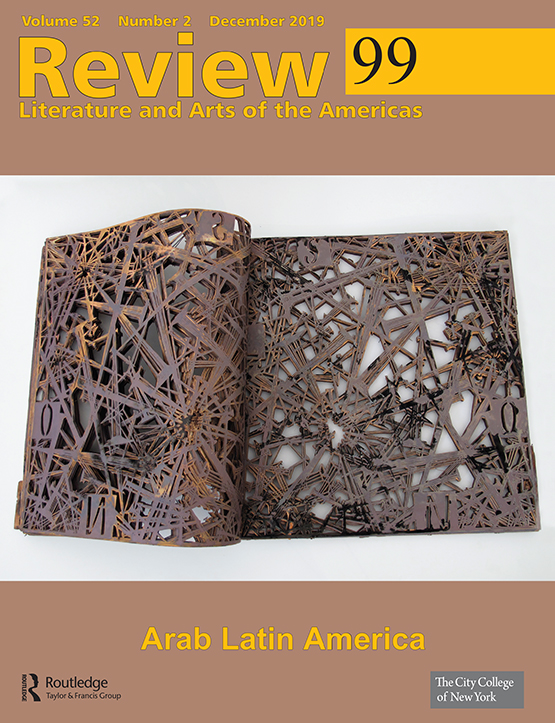
Review 99, guest-edited by Waïl Hassan (University of Illinois at Urbana-Champaign), explores “Arab Latin America.” The issue compiles a breadth of texts and other materials, beginning with Hassan’s cogent introduction, followed by critical essays by leading scholars on emblematic topics—Arab themes in José Martí’s Oriente; Juan José Saer as an Arab Argentine writer; human-animal entanglements in Marcelo Maluf’s fiction; and Palestinian Chilean cinema—as well as fiction, poetry, creative essays, crônicas, and interviews featuring writers/artists of Arab background hailing from Argentina, Bolivia, Brazil, Chile, Colombia, Mexico, and Peru—descendants of immigrants from Lebanon, Palestine, and Syria. The roster of authors includes Esther Andradi, Jeannette Clariond, Luis Fayad, Milton Hatoum, Mamede Mustafa Jarouche, Maluf, Mahfud Massis, Eduardo Mitre, Alberto Mussa, Alonso Rabí-do-Carmo, and Waly Salomão. Together, their contributions address themes not only particular to Arab Latin America but to universal culture—those relating to identity, language, community, and exile. The issue also includes features—an interview with author Carmen Boullosa, the 2018 Cátedra Vargas Llosa fellow at CCNY; and poetry by Freddy Yezzed—reviews of the films Christian Palestine in Chile, directed by Heba El Attar, and of the animated film, Kahlil Gibran’s The Prophet, produced by Salma Hayek; and book reviews of Christina Civantos’s The Afterlife of al-Andalus, as well as of new titles in translation.
THE LAUNCH OF REVIEW 98: TUESDAY SEPTEMBER 17, 2019 - 5:00-8:00 PM - SHEPARD HALL 250
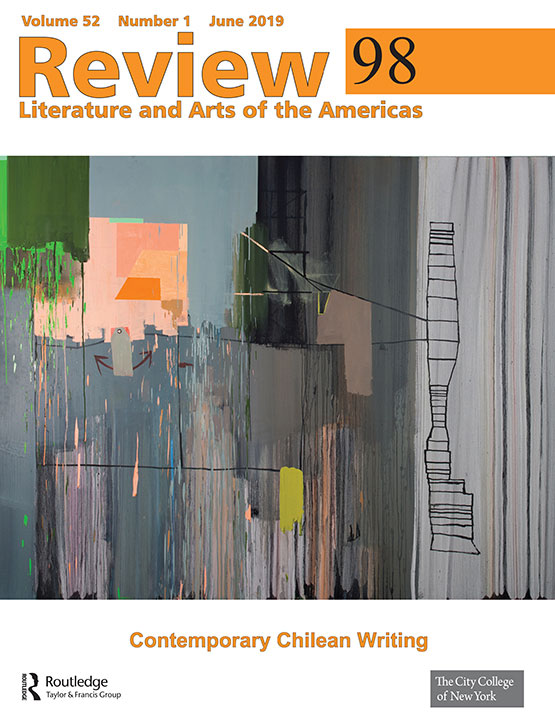
Review 98, guest-edited by award-winning novelist Carlos Franz, a fellow of CCNY’s Cátedra Vargas Llosa, focuses on contemporary Chilean writing. Franz’s opening essay, “Imaginary Territories,” introduces and contextualizes the selections compiled in the issue—fiction and poetry by authors including Jorge Edwards, Diamela Eltit, Arturo Fontaine, Rafael Gumucio, Óscar Hahn, Leonel Lienlaf, Sergio Missana, María José Navia, Marcelo Rioseco, Manuel Silva Acevedo, and Ursula Starke; and essays by scholars Will Corral, Felipe Cussen, and Alfonso de Toro on specific works and current trends in Chilean literature and culture. Among the issue’s features are an excerpt from Joanne Pottlitzer’s “Symbols of Resistance,” a memorial piece on Cuban poet Carilda Oliver Labra, and poetry by Homero Aridjis; reviews cover new titles in translation by Chilean authors Marjorie Agosín, Pablo de Rokha, Ariel Dorfman, Rodrigo Lira, and Cecilia Vicuña, among others representing Latin American and Caribbean writing and arts.
THE LAUNCH OF REVIEW 97: WEDNESDAY APRIL 10, 2019 - 5:00-8:00 PM - SHEPARD HALL 95
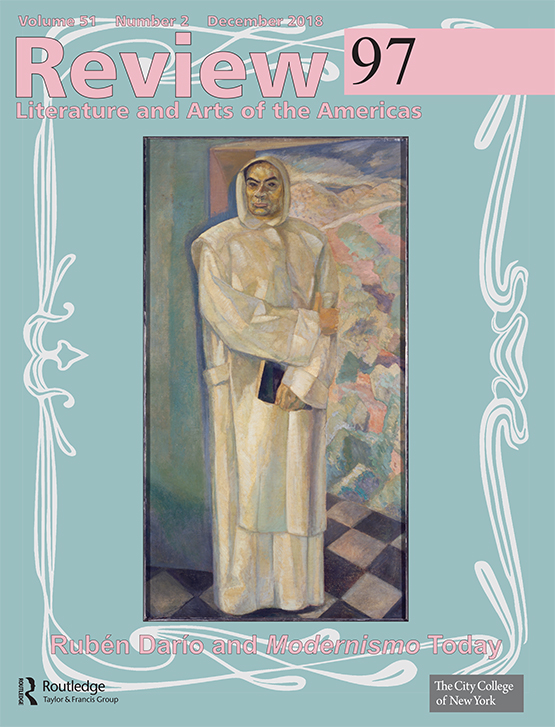
Review 97, guest-edited by scholar Andrew Reynolds (West Texas A & M University), focuses on Rubén Darío and Modernismo Today. Reynolds’s introduction, “The Enduring Scholarly and Creative Legacies of Rubén Darío and Modernismo,” is followed by critical essays about Darío’s life and work by scholars Gwen Kirkpatrick, Adela Pineda Franco, José González, and Julia Medina. The issue showcases newly translated poems and essays by Darío himself and other Modernista writers such as Delmira Agustini and Alfonsina Storni; appraisals of Darío by other masters (Borges, García Lorca, and Neruda); and contemporary texts, by fellow Nicaraguan author Sergio Ramírez, and by scholars Günther Schmigalle and Erick Blandón, as well as original poetry by poets from the region. A special section on Darío and the U.S. includes an essay by Jorge Eduardo Arellano, and a portfolio of images of Darío reveals him in various roles and guises. Features include a memorial piece by Sergio Ramírez on Nicaraguan poet Claribel Alegría, an interview with and fiction by Mónica Lavín, 2017 fellow of CCNY’s Cátedra Mario Vargas Llosa; a reflection by Alberto García Ferrer on Gabriel García Márquez, and an overview of Venezuelan literature, by Lyda Aponte de Zacklin, paired with a story by Humberto Mata. Review 97 concludes with reviews of newly published titles in English and English translation.
The Launch of Review 96: October 2nd 2018 at 5:00 PM, Faculty Dining Room, NAC 3rd Floor
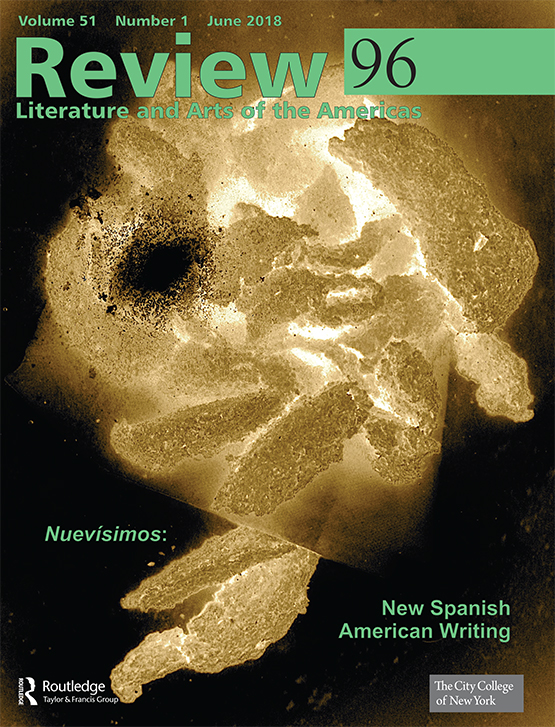
Review 96, guest-edited by scholar/author Aníbal González (Yale University), focuses on Nuevísimo writing from throughout Spanish America, characterized by a breadth of aesthetic approaches and employment of elements including self-fictionalization, critique of nationalism, and interest in other disciplines and genres such as crime and science fiction. The contents showcase essays by scholars Eduardo Becerra, Gustavo Guerrero, Héctor Hoyos, and Catalina Quesada; and fiction and poetry by writers including Frank Báez, León Félix Batista, Luis Hernán Castañeda, Luis Felipe Fabre, Francisco Font-Acevedo, Lina Meruane, María Miranda, Mayra Santos-Febres, Andrés Felipe Solano, Anna Lidia Vega Serova, and Carlos Yushimito. It also includes features by Luisa Valenzuela and others; and reviews of new titles in translation.
The Launch of Review 95: April 16th, 2018 at 5:00 PM, Faculty Dining Room, NAC 3rd Floor
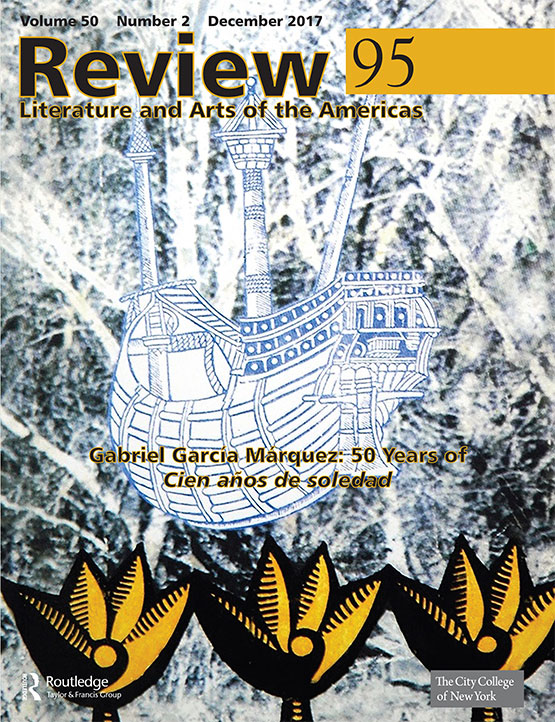
Review 95 (Fall 2017), guest-edited by scholar and author Deborah Cohn (Indiana University Bloomington), focuses on the reception and legacy of Gabriel García Márquez’s masterpiece, Cien años de soledad (One Hundred Years of Solitude). The issue includes scholarly and creative essays by friends, colleagues, and younger writers—among them Jaime Abello, Santiago Gamboa, Gerald Martin, Julio Ortega, Pedro Palou, Silvana Paternostro, Elena Poniatowska, María Helena Rueda, Philip Swanson, and Rose Styron—whose lives and work have been touched by García Márquez’s novel, as well as texts addressing other dimensions of the author’s development, including his forays into film and his long career as a journalist. It also includes a conversation with renowned translators Edith Grossman, Suzanne Jill Levine, and Alfred Mac Adam exploring the novel and its landmark English version by the late Gregory Rabassa. Fiction by Boom-era novelist Juan Carlos Onetti, a memorial piece by poet Lorna Goodison on the late Nobel Laureate Derek Walcott, and reviews of new Latin American and Caribbean titles round out this exciting issue.
The Launch of Review 94: October 5th, 2017 at 5:30 PM Faculty Dining Room, Nac, 3rd Floor

Review 94 (Fall 2017), guest-edited by author Ernesto Quiñónez, focuses on Latin American and Latino writers affiliated with The City College of New York, CUNY, as alumni and/or faculty. The selection of writers, scholars, and others in the issue includes texts by Ernesto Quiñónez, Guest Editor; and by Oscar Hijuelos; Raquel Chang-Rodríguez; Lyn Di Iorio; Edith Grossman; Jaime Manrique; Luis Rafael Sánchez; and David Unger; as well as a conversation between Nobel Laureate Mario Vargas Llosa and author Alonso Cueto, as part of the Cátedra Vargas Llosa at CCNY; an interview by Jerry W. Carlson with Cuban author Leonardo Padura; essays and fiction by former CCNY students Victoria Chevalier, Jaime Mundo, Richard Perez, and Abraham Rodriguez; other literary texts; and art by Tanya Torres. This special issue celebrates the rebranding of Review Magazine via Routledge and The City College of New York.
The launch of Review 92/93: April 19th, 2017 at 5:00 PM - Shepard Hall 250
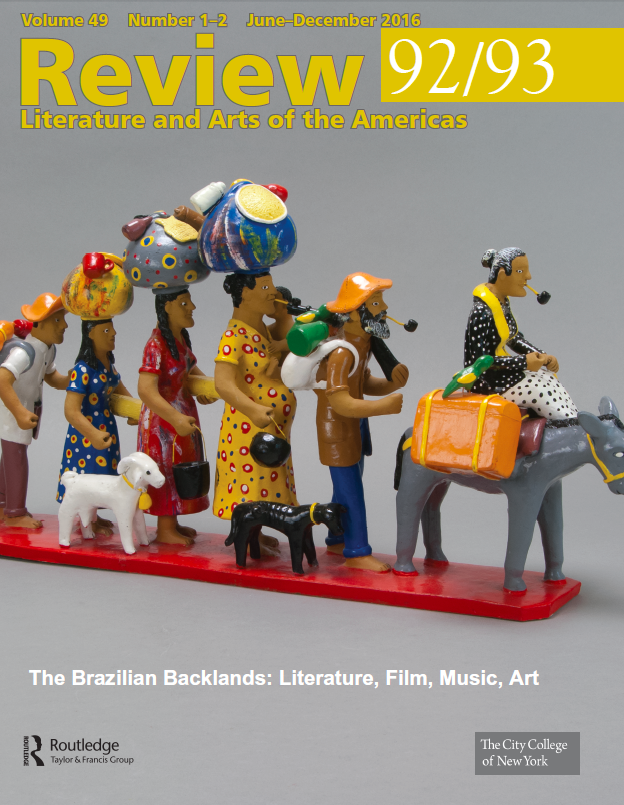
Review 92/93 (June-December 2016), guest-edited by Elizabeth Lowe, focuses on the Brazilian Backlands in Literature and Arts. It includes scholarly articles on literature, film, music, and art of the Brazilian Northeast; fiction by seminal figures such as José de Alencar, Euclides da Cunha, Gracilano Ramos, and Ariano Suassuna, as well as cordel poetry, and work by modern and contemporary authors such as João Cabral de Melo Neto, Rachel de Queiroz, Marcelino Freire, Clarice Lispector, and Nélida Piñon. The issue includes features by a plethora of writers from throughout the region, reviews of major literary festivals and book fairs, and book reviews of new titles in English translation.
For further information about Review, visit: www.tandfonline.com/toc/rrev20/current
Contact: Daniel Shapiro, Editor, at dshapiro@ccny.cuny.edu or (212) 650-6338.
CHECK OUT THE LATEST UPDATES OF REVIEW ON SOCIAL MEDIA:
https://www.facebook.com/ReviewCmll/
Review (@ReviewCmll) | Twitter
"A Conversation with Edith Grossman" - video
Captions:
Banner: Review 91 (“A Year in Review,” Fall 2015). Cover-image (detail) by Lydia Rubio © 2015.
Top: Review 107. Cover image by Emma Luna, El nido (The Nest), 2010. Private collection. Courtesy of Emma Luna. Photo by Will H. Corral. Cover design: Daimys García.
Second from top: Review 106. Cover image by Jorge Pineda, Ensayo y error (Trial and Error), 2020. Photo: Mariano Hernández. Courtesy of Alejandra Peláez Pineda. Cover design: Daimys García.
Third From top: Review 105. Cover image: People touch a Ceiba tree as they walk around it following a tradition believed to bring good luck by San Cristóbal, patron Saint of Havana, during the city's 499th anniversary in Havana, Cuba, November 16, 2018. REUTERS/Alexandre Meneghini. Alamy Stock Photo. Cover Design: Daimys García.
Fourth from top: Review 104. Cover image by Ana Istarú, Baby Boom en el Paraíso, 1996. Photo by Javier Guerrero. Courtesy of Ana Istarú. Cover Design Daimys García.
Fifth from top: Review 103. Cover image by Alexander Apóstol. From Régimen: Dramatis Personae (El Heroe), 2018 Image courtesy of the artist. Cover design Daimys Gracía.
Sixth from top: Review 102. Cover image by Vincent Catala, A lonely man waiting for his bus on Avenida Paulista. São Paulo, March 2020. Image courtesy of the artist. Cover design: Daimys García.
Seventh from top: Review 101. Cover image by Jorge Macchi, Memoria Externa 12, 2014. Photo: Joerg Lohse. Courtesy Alexander and Bonin Gallery. Cover design: Daimys García.
Eighth from top: Review 100. Cover image by Leonora Carrington, Quería ser pájaro [I Wanted to be a Bird], 1960. © Estate of Leonora Carrington / Artists Rights Society (ARS), New York. Courtesy Gallery Wendi Norris, San Francisco. Cover design: Daimys García
Ninth from top: Review 99. Cover image by Hilal Sami Hilal, Livro Futurista—pregos/cornetas (Futurist Book—nails/horns), 2012. Reproduced courtesy of Galeria Marilia Razuk, São Paulo, Brazil. Cover design: Daimys García.
Tenth from top: Review 98. Cover image by Samy Benmayor, Paracelso's Ladder, 2017. Courtesy of the artist. Design: Daimys García.
Eleventh from top: Review 97. Cover image by Daniel Vázquez Díaz, Rubén Darío vestido de monje [Rubén Darío Dressed as a Monk], 1914. Photo credit: Photographic Archives Museo Nacional Centro de Arte Reina Sofía. Image reproduction: Museo Nacional Centro de Arte Reina Sofía. Design: Daimys García.
Twelfth from top: Review 96. Cover image by Jesús Aguilar, “Vestigio X-V,” 2010-11. From “Nothing Will Be As It Was.” Courtesy of the artist/Sandra Handloser Co. Design: Daimys García.
Thirteenth from top: Review 95. Cover image: Detail from Gabriel García Márquez’s Cien años de soledad (Buenos Aires: Sudamericana, 1967). Cover artist: Iris Alba. Courtesy Penguin Random House Argentina. Magazine design: Daimys García.
Fourteenth from top: Review 94. Cover image by Tanya Torres, Music (detail), 2007. Mosaic. P.S. / M.S. 57, New York City. Courtesy of the artist. Photo © 2016 Elsa Ruiz. Design: Daimys García.
Bottom: Review 92/93. Cover image by Manoel Eudócio, Retirantes, 1995. © Museum of International Folk Art, photo by E. Luthi. Design: Daimys García.
Last Updated: 09/25/2025 16:28
